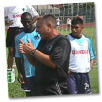Kenneth Graham Interview
One of the high points from of my trip to Australia last year was getting time to visit with Kenneth Graham, Principal Scientist - New South Wales Institute of Sport. He is a really bright guy who gets it.He understands that his role as a sports scientist is to support the coach. My conversations with him really got my wheels turning.
What are most essential requirements for a successful conditioning program? Having a plan… determining what is your outcome and putting the basics in place so when you do the specifics you are getting the most bang for your buck. For example:
If you need to lift heavy to get a performance gain through improved strength or power first make sure your technique is bullet proof.
If you are doing repeated sprints for team sport conditioning do some underpinning work for some lactate tolerance so you can get through the repeated sprint session
What are the most common mistakes in conditioning? It is generally easier to write a training program than do it. There is potentially to much work put into the training program of developing athletes by coaches and trainers. Try the sessions you write….. it changed my attitude to the development of training sessions
How important is specificity? For me specificity means both doing the training that will provide you with the gains you are after and doing the right training at the right phase of your training.
What aspect of conditioning athletes is most difficult and how have you tried to address it? The balance between getting the athlete technically efficient and physically developed…… I have tried to address it by hanging around some of the best coaches in the world and looked at how they have done it.
It was a benefit of being in Sydney prior to the 2000 Olympics.. .there were some of the best coaches from many countries across multiple sports…..
With the plethora of information available how can you determine what is best? I look for consistency in the information whether it be verbal advice or from reading journal articles, having it backed by evidence increase my confidence in using the information. If you talk to top level sprint coaches a large percentage of what they say is similar…. I would back this as being the key message
Where do you stand on nature versus nurture? How much difference can training make? Your genetics determines the limits to your potential; your training determines if you reach them….. and the combination of all of all of them produces a competition performance. I have seen many athletes with the characteristics of a world champion… a lot less who do the work and become one
What is the sure sign that a self proclaimed conditioning guru is not a good source of advice? For me the better the information the more likely it is to come as advice or with caveats. The more the person says “this is the only way to do it” the less likely that is the case.
What has been the biggest innovation in training that you have seen during the course of your career and where is the biggest room for innovation in training athletes? Most probably two. These are the realization and recognition that the intensity of the work is the key to stimulating the adaptation that you are after…. And the leading of training adaptation with the focus on technique.
What is the biggest room for innovation? Most probably understanding how training stimulates the adaptive process
Who has been a role model in your career and why? A hard one… a combination of coaches and scientists…. The coaches who put their athletes first. Coaches and scientist who were open to accepting the knowledge of others and open in giving their knowledge away….
What are the biggest professional challenges have you had to face? Learning how to turn science speak into coach speak… turning what I know into information useful to others.
Which changes now taking place in your field that should be encouraged, and which resisted? A colleague presented at a conference recently and he pushed the idea that sport scientists are now hiding behind technology and not getting out there and pushing forward with knowledge….. Get out and use your knowledge and don’t hide behind technology.


1 Comments:
Hi Vern Great interview Ken is a great thinker and inspired me as an undergraduate to really know and understand the science behind the training you prescribe. It was interesting re coaches giving too much work and his recomendation to try your own program. I have found this to be very valuable so you can truly understand what your athletes are going through. Great stuff thanks Vern
Post a Comment
<< Home